(完整版)定语从句inwhich等的用法
- 格式:doc
- 大小:39.51 KB
- 文档页数:4
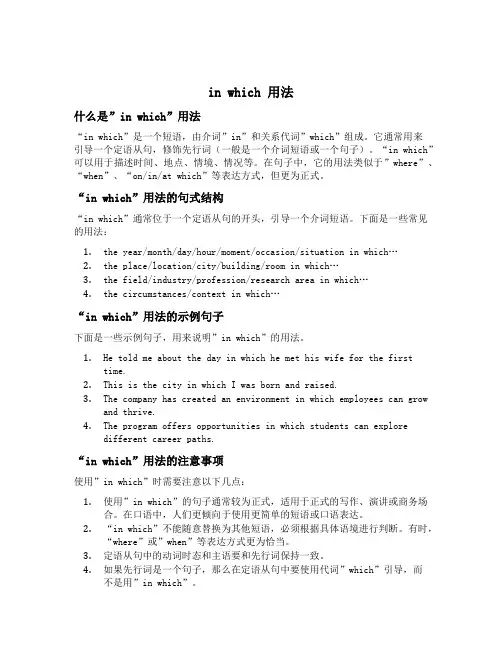
in which 用法什么是”in which”用法“in which”是一个短语,由介词”in”和关系代词”which”组成。
它通常用来引导一个定语从句,修饰先行词(一般是一个介词短语或一个句子)。
“in which”可以用于描述时间、地点、情境、情况等。
在句子中,它的用法类似于”where”、“when”、“on/in/at which”等表达方式,但更为正式。
“in which”用法的句式结构“in which”通常位于一个定语从句的开头,引导一个介词短语。
下面是一些常见的用法:1.the year/month/day/hour/moment/occasion/situation in which…2.the place/location/city/building/room in which…3.the field/industry/profession/research area in which…4.the circumstances/context in which…“in which”用法的示例句子下面是一些示例句子,用来说明”in which”的用法。
1.He told me about the day in which he met his wife for the firsttime.2.This is the city in which I was born and raised.3.The company has created an environment in which employees can growand thrive.4.The program offers opportunities in which students can exploredifferent career paths.“in which”用法的注意事项使用”in which”时需要注意以下几点:1.使用”in which”的句子通常较为正式,适用于正式的写作、演讲或商务场合。
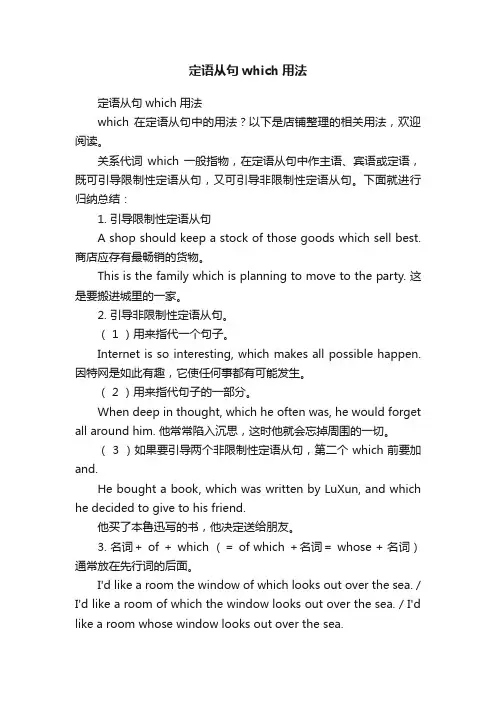
定语从句which用法定语从句which用法which 在定语从句中的用法?以下是店铺整理的相关用法,欢迎阅读。
关系代词which 一般指物,在定语从句中作主语、宾语或定语,既可引导限制性定语从句,又可引导非限制性定语从句。
下面就进行归纳总结:1. 引导限制性定语从句A shop should keep a stock of those goods which sell best. 商店应存有最畅销的货物。
This is the family which is planning to move to the party. 这是要搬进城里的一家。
2. 引导非限制性定语从句。
( 1 )用来指代一个句子。
Internet is so interesting, which makes all possible happen. 因特网是如此有趣,它使任何事都有可能发生。
( 2 )用来指代句子的一部分。
When deep in thought, which he often was, he would forget all around him. 他常常陷入沉思,这时他就会忘掉周围的一切。
( 3 )如果要引导两个非限制性定语从句,第二个 which 前要加and.He bought a book, which was written by LuXun, and which he decided to give to his friend.他买了本鲁迅写的书,他决定送给朋友。
3. 名词+ of + which (= of which +名词= whose + 名词)通常放在先行词的后面。
I'd like a room the window of which looks out over the sea. / I'd like a room of which the window looks out over the sea. / I'd like a room whose window looks out over the sea.我要一间窗户面临大海的房间。
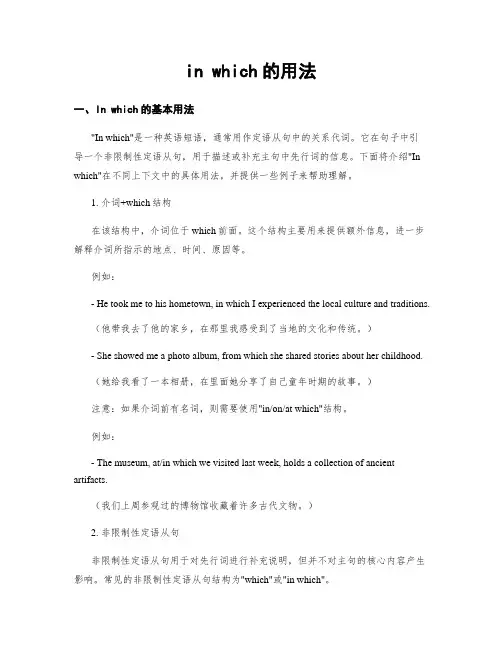
in which的用法一、In which的基本用法"In which"是一种英语短语,通常用作定语从句中的关系代词。
它在句子中引导一个非限制性定语从句,用于描述或补充主句中先行词的信息。
下面将介绍"In which"在不同上下文中的具体用法,并提供一些例子来帮助理解。
1. 介词+which结构在该结构中,介词位于which前面。
这个结构主要用来提供额外信息,进一步解释介词所指示的地点、时间、原因等。
例如:- He took me to his hometown, in which I experienced the local culture and traditions.(他带我去了他的家乡,在那里我感受到了当地的文化和传统。
)- She showed me a photo album, from which she shared stories about her childhood.(她给我看了一本相册,在里面她分享了自己童年时期的故事。
)注意:如果介词前有名词,则需要使用"in/on/at which"结构。
例如:- The museum, at/in which we visited last week, holds a collection of ancient artifacts.(我们上周参观过的博物馆收藏着许多古代文物。
)2. 非限制性定语从句非限制性定语从句用于对先行词进行补充说明,但并不对主句的核心内容产生影响。
常见的非限制性定语从句结构为"which"或"in which"。
例如:- They went to the park, in which they enjoyed a picnic.(他们去了公园,在那里他们享受了一次野餐。
)- The book, which was recommended by my teacher, turned out to be very interesting.(这本书是我老师推荐的,结果发现它非常有趣。
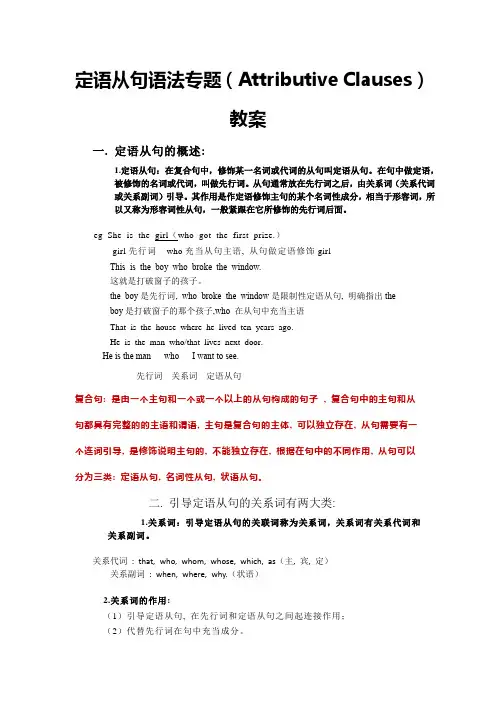
定语从句语法专题(Attributive Clauses)教案一. 定语从句的概述:1.定语从句:在复合句中,修饰某一名词或代词的从句叫定语从句。
在句中做定语,被修饰的名词或代词,叫做先行词。
从句通常放在先行词之后,由关系词(关系代词或关系副词)引导。
其作用是作定语修饰主句的某个名词性成分,相当于形容词,所以又称为形容词性从句,一般紧跟在它所修饰的先行词后面。
eg She is the girl(who got the first prize.)girl先行词who充当从句主语, 从句做定语修饰girlThis is the boy who broke the window.这就是打破窗子的孩子。
the boy是先行词, who broke the window是限制性定语从句, 明确指出theboy是打破窗子的那个孩子,who 在从句中充当主语That is the house where he lived ten years ago.He is the man who/that lives next door.He is the man who I want to see.先行词关系词定语从句复合句: 是由一个主句和一个或一个以上的从句构成的句子, 复合句中的主句和从句都具有完整的的主语和谓语, 主句是复合句的主体, 可以独立存在, 从句需要有一个连词引导, 是修饰说明主句的, 不能独立存在, 根据在句中的不同作用, 从句可以分为三类: 定语从句, 名词性从句, 状语从句。
二. 引导定语从句的关系词有两大类:1.关系词:引导定语从句的关联词称为关系词,关系词有关系代词和关系副词。
关系代词: that, who, whom, whose, which, as(主, 宾, 定)关系副词: when, where, why.(状语)2.关系词的作用:(1)引导定语从句, 在先行词和定语从句之间起连接作用;(2)代替先行词在句中充当成分。
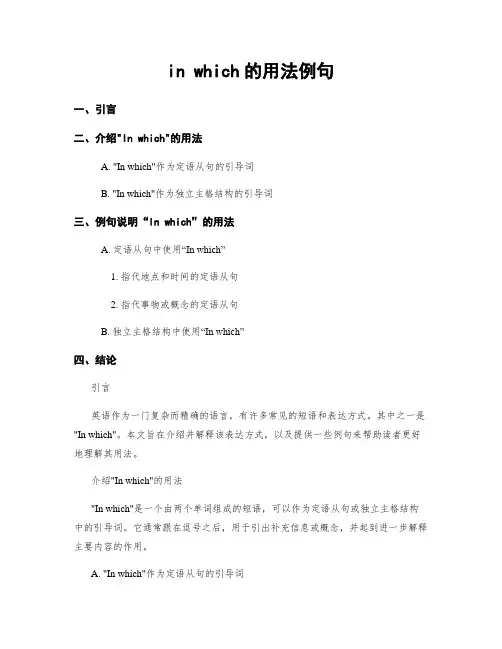
in which的用法例句一、引言二、介绍"In which"的用法A. "In which"作为定语从句的引导词B. "In which"作为独立主格结构的引导词三、例句说明“In which”的用法A. 定语从句中使用“In which”1. 指代地点和时间的定语从句2. 指代事物或概念的定语从句B. 独立主格结构中使用“In which”四、结论引言英语作为一门复杂而精确的语言,有许多常见的短语和表达方式。
其中之一是"In which"。
本文旨在介绍并解释该表达方式,以及提供一些例句来帮助读者更好地理解其用法。
介绍"In which"的用法"In which"是一个由两个单词组成的短语,可以作为定语从句或独立主格结构中的引导词。
它通常跟在逗号之后,用于引出补充信息或概念,并起到进一步解释主要内容的作用。
A. "In which"作为定语从句的引导词当我们想要进一步描述或解释某个事物时,可以使用"In which"作为定语从句中的引导词。
它可以指代一个地点、时间、物体或概念。
B. "In which"作为独立主格结构的引导词另外,在某些情况下,我们也可以使用"In which"作为独立主格结构中的引导词。
这种用法通常在句子中用逗号隔开,表达特定的情况或背景信息。
例句说明“In which”的用法接下来,我们将通过一些例句来说明"In which"在不同语境中的用法和含义。
A. 定语从句中使用“In which”1. 指代地点和时间的定语从句"The house, in which they grew up, was recently demolished."这句话中,“in which”引导了一个定语从句,修饰了前面提到的房子。
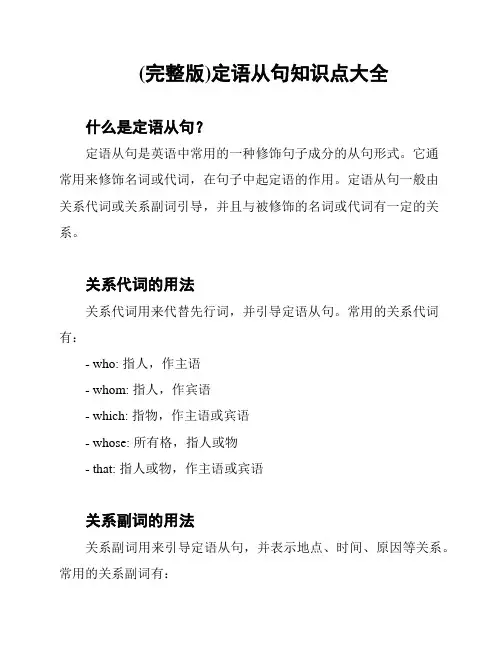
(完整版)定语从句知识点大全什么是定语从句?定语从句是英语中常用的一种修饰句子成分的从句形式。
它通常用来修饰名词或代词,在句子中起定语的作用。
定语从句一般由关系代词或关系副词引导,并且与被修饰的名词或代词有一定的关系。
关系代词的用法关系代词用来代替先行词,并引导定语从句。
常用的关系代词有:- who: 指人,作主语- whom: 指人,作宾语- which: 指物,作主语或宾语- whose: 所有格,指人或物- that: 指人或物,作主语或宾语关系副词的用法关系副词用来引导定语从句,并表示地点、时间、原因等关系。
常用的关系副词有:- where: 表示地点- when: 表示时间- why: 表示原因定语从句的形式定语从句可以是限制性的,也可以是非限制性的。
限制性定语从句限制性定语从句是对先行词进行限定和修饰的从句,如果去掉,整个句子的意思就不完整或失去了关键信息。
限制性定语从句通常使用关系代词和关系副词引导,关系代词在从句中作主语或宾语。
非限制性定语从句非限制性定语从句是对先行词进行补充说明,它对整个句子的意思并不具有限制作用,就算去掉也不会影响主句的表达。
非限制性定语从句通常使用逗号将其和主句隔开,关系代词在从句中作主语或宾语。
定语从句的位置定语从句可以放在先行词之后,也可以放在先行词之前。
定语从句的例句- I have a friend who lives in New York.(非限制性定语从句)- The book that you borrowed is on the desk.(限制性定语从句)以上就是关于定语从句的一些基本知识点。
定语从句在英语语法中是一个重要的内容,掌握好定语从句的用法可以有效地提升我们的写作水平。
希望本文对您有所帮助!。
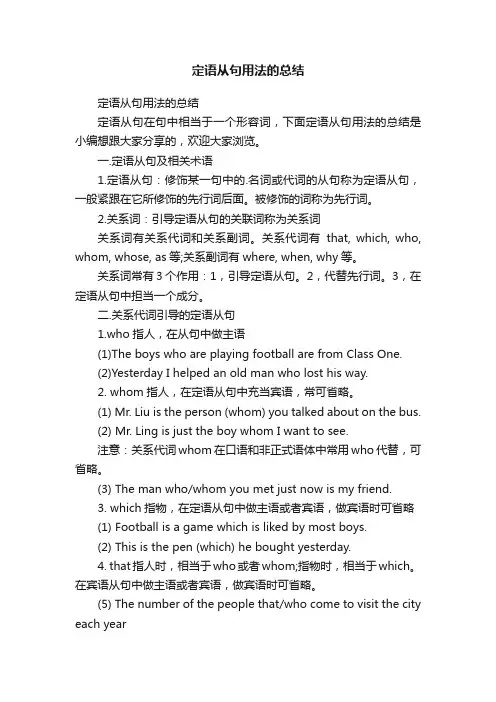
定语从句用法的总结定语从句用法的总结定语从句在句中相当于一个形容词,下面定语从句用法的总结是小编想跟大家分享的,欢迎大家浏览。
一.定语从句及相关术语1.定语从句:修饰某一句中的.名词或代词的从句称为定语从句,一般紧跟在它所修饰的先行词后面。
被修饰的词称为先行词。
2.关系词:引导定语从句的关联词称为关系词关系词有关系代词和关系副词。
关系代词有that, which, who, whom, whose, as等;关系副词有where, when, why等。
关系词常有3个作用:1,引导定语从句。
2,代替先行词。
3,在定语从句中担当一个成分。
二.关系代词引导的定语从句1.who指人,在从句中做主语(1)The boys who are playing football are from Class One.(2)Yesterday I helped an old man who lost his way.2. whom指人,在定语从句中充当宾语,常可省略。
(1) Mr. Liu is the person (whom) you talked about on the bus.(2) Mr. Ling is just the boy whom I want to see.注意:关系代词whom在口语和非正式语体中常用who代替,可省略。
(3) The man who/whom you met just now is my friend.3. which指物,在定语从句中做主语或者宾语,做宾语时可省略(1) Football is a game which is liked by most boys.(2) This is the pen (which) he bought yesterday.4. that指人时,相当于who或者whom;指物时,相当于which。
在宾语从句中做主语或者宾语,做宾语时可省略。
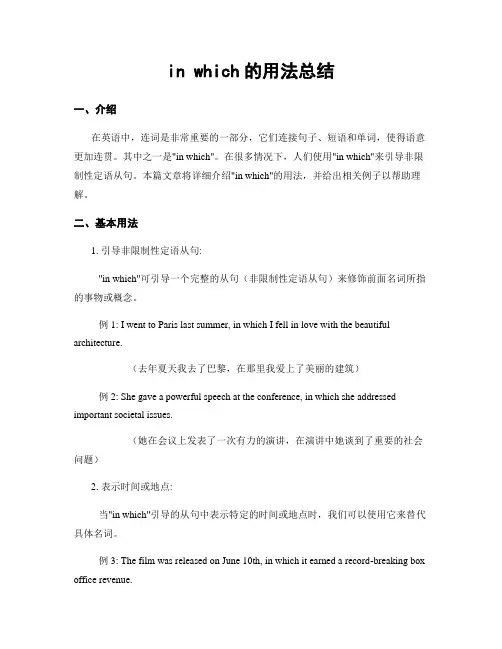
in which的用法总结一、介绍在英语中,连词是非常重要的一部分,它们连接句子、短语和单词,使得语意更加连贯。
其中之一是"in which"。
在很多情况下,人们使用"in which"来引导非限制性定语从句。
本篇文章将详细介绍"in which"的用法,并给出相关例子以帮助理解。
二、基本用法1. 引导非限制性定语从句:"in which"可引导一个完整的从句(非限制性定语从句)来修饰前面名词所指的事物或概念。
例1: I went to Paris last summer, in which I fell in love with the beautiful architecture.(去年夏天我去了巴黎,在那里我爱上了美丽的建筑)例2: She gave a powerful speech at the conference, in which she addressed important societal issues.(她在会议上发表了一次有力的演讲,在演讲中她谈到了重要的社会问题)2. 表示时间或地点:当"in which"引导的从句中表示特定的时间或地点时,我们可以使用它来替代具体名词。
例3: The film was released on June 10th, in which it earned a record-breaking box office revenue.(这部电影在6月10日上映,创下了票房纪录)例4: The conference will be held in Paris, in which many scholars and experts are expected to participate.(会议将在巴黎举行,届时将有许多学者和专家参加)三、相关用法1. "the year/period in which":"in which"还可以与"the year/period"结合使用,表示一个特定的时间段。
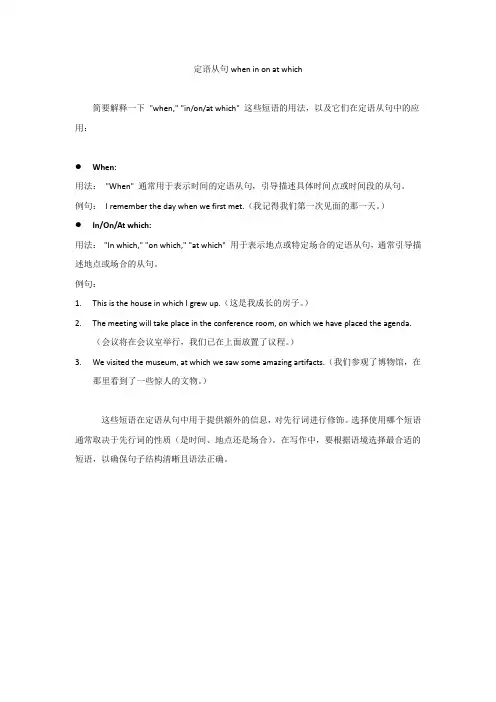
定语从句when in on at which
简要解释一下"when," "in/on/at which" 这些短语的用法,以及它们在定语从句中的应用:
●When:
用法:"When" 通常用于表示时间的定语从句,引导描述具体时间点或时间段的从句。
例句:I remember the day when we first met.(我记得我们第一次见面的那一天。
)
●In/On/At which:
用法:"In which," "on which," "at which" 用于表示地点或特定场合的定语从句,通常引导描述地点或场合的从句。
例句:
1.This is the house in which I grew up.(这是我成长的房子。
)
2.The meeting will take place in the conference room, on which we have placed the agenda.
(会议将在会议室举行,我们已在上面放置了议程。
)
3.We visited the museum, at which we saw some amazing artifacts.(我们参观了博物馆,在
那里看到了一些惊人的文物。
)
这些短语在定语从句中用于提供额外的信息,对先行词进行修饰。
选择使用哪个短语通常取决于先行词的性质(是时间、地点还是场合)。
在写作中,要根据语境选择最合适的短语,以确保句子结构清晰且语法正确。
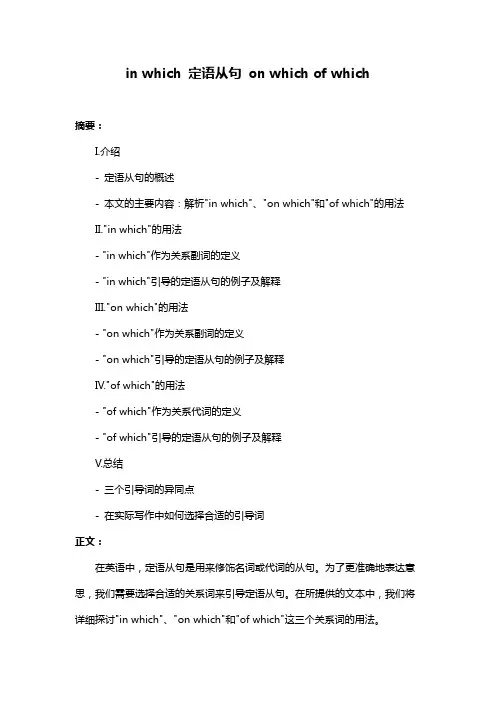
in which 定语从句on which of which摘要:I.介绍- 定语从句的概述- 本文的主要内容:解析"in which"、"on which"和"of which"的用法II."in which"的用法- "in which"作为关系副词的定义- "in which"引导的定语从句的例子及解释III."on which"的用法- "on which"作为关系副词的定义- "on which"引导的定语从句的例子及解释IV."of which"的用法- "of which"作为关系代词的定义- "of which"引导的定语从句的例子及解释V.总结- 三个引导词的异同点- 在实际写作中如何选择合适的引导词正文:在英语中,定语从句是用来修饰名词或代词的从句。
为了更准确地表达意思,我们需要选择合适的关系词来引导定语从句。
在所提供的文本中,我们将详细探讨"in which"、"on which"和"of which"这三个关系词的用法。
首先,我们来了解"in which"的用法。
"in which"作为一个关系副词,通常用来引导表示地点、时间或范围的定语从句。
例如:- The book, in which we are interested, is a fascinating one.(我们感兴趣的这本书非常迷人。
)这里,"in which"引导的定语从句修饰名词"book",表示我们对这本书感兴趣。
接下来,我们分析"on which"的用法。
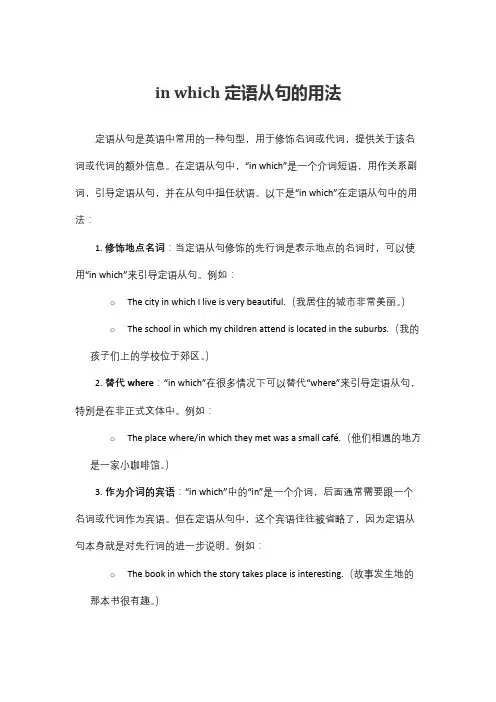
in which定语从句的用法定语从句是英语中常用的一种句型,用于修饰名词或代词,提供关于该名词或代词的额外信息。
在定语从句中,“in which”是一个介词短语,用作关系副词,引导定语从句,并在从句中担任状语。
以下是“in which”在定语从句中的用法:1.修饰地点名词:当定语从句修饰的先行词是表示地点的名词时,可以使用“in which”来引导定语从句。
例如:o The city in which I live is very beautiful.(我居住的城市非常美丽。
)o The school in which my children attend is located in the suburbs.(我的孩子们上的学校位于郊区。
)2.替代where:“in which”在很多情况下可以替代“where”来引导定语从句,特别是在非正式文体中。
例如:o The place where/in which they met was a small café.(他们相遇的地方是一家小咖啡馆。
)3.作为介词的宾语:“in which”中的“in”是一个介词,后面通常需要跟一个名词或代词作为宾语。
但在定语从句中,这个宾语往往被省略了,因为定语从句本身就是对先行词的进一步说明。
例如:o The book in which the story takes place is interesting.(故事发生地的那本书很有趣。
)4.与“at which”和“on which”的区别:“in which”与“at which”和“on which”的区别主要在于它们所修饰的先行词和所表达的时间或位置关系。
例如:o The house in which I live is on a busy street.(我住的房子位于一条繁忙的街道上。
)o The moment at which he arrived was exactly 10 o'clock.(他到达的时刻正好是10点。
which的用法总结在英语中,我们会常常用到which这个单词,了解which的意思和用法,以便自己今后更好地运用它,那么which的用法有哪些呢?下面是小编给大家带来的which的用法总结_which的用法例句,以供大家参考,我们一起来看看吧!which的释义adj.哪一个;哪一些pron.哪一个;哪些▼which的用法定语从句的关系代词Which的用法: 若先行词指物则代替先行词在定语从句中充当主语或宾语.This is the pen which was given by my friend.先行词指物代替先行词在定语从句中充当主语This is the pen which my friend gave to me.先行词指物代替先行词在定语从句中充当宾语下面是它和that在定语从句中的区别及用法:that \which在代物时常常可以通用,但有时只宜于用which ,不用that(1) 关系代词前有介词时.This is the hotel in which you will stay.(2) 如有两个定语从句,其中一句的关系代词是that,另一句宜于用which.Let me show you the novel that I borrowed from the liberary which was newly open (新开放) to us.that \which在代物时常常可以通用,但有时只宜于用that ,不用which.(1) 先行词是形容词最高级或者它的前面有形容词最高级时This is the best that has been used against air pollution(反对空气污染) in cities.English is the most difficult subject that you will learn during these years.(2) 先行词是序数词,或它的前面有一个序数词时He is the last person that I want to see.(3) 主句中已有疑问词时Which is the bike that you lost?(4) 先行词既有人又有物时The bike and its rider that had run over (撞倒了)an old man were taken to the police station.(5) 先行词是all,much,little,something,everything,anything,nothing,none,the one等代词时You should hand in all that you have.We haven’t got much that we can offer you.I mean the one that you talked about just now.(6) 先行词前面有only,any,few,little,no,all,one of,the same,the very等词修饰时The only thing that we can do is to give you some money.Li Ming is the only one that got full marks (满分)in our class.Li Ming is one of the students that want to be teachers in our class.(7) 有两个定语从句,其中一个关系代词已用which,另外一个宜用thatEdison built up a factory(办了一个工厂) which produced things that had never been seen before.定语从句的关系副词 Where的用法:若先行词指地点且其在定语从句中充当地点状语.This is the house+I was born in the house. (=I was born there) 介词短语副词=This is the house where I was born.这就是我在那儿出生的房子.先行词关系副词in which I was born.介词+关系代词which I was born in.关系代词这里作介宾的which和that可以省略that I wos born in charge的用法:1. 用作名词,注意以下用法:(1) 表示“收费”,是可数名词,通常(但不一定)用复数形式。
定语从句(完整版)定语从句是用关系代词或关系副词引导的从句,它的作用是修饰主句中的名词性成分,相当于形容词。
关系词包括关系代词和关系副词,常用的关系代词有that、which、who、whom、whose、as等,而关系副词则有where、when、why等。
关系词有三个作用,即引导定语从句、代替先行词、在定语从句中担当一个成分。
需要注意的是,关系代词有主语和宾语之分,其中whom通常作为宾语。
定语是用来限定、修饰名词或代词的,它可以由形容词、名词、代词、数词、分词、副词、不定式以及介词短语来担任,甚至可以由一个句子来担任。
在汉语中,我们通常用“……的”表示定语。
单词作定语时通常放在它所修饰的词之前,作前置定语;而短语和从句作定语时则放在所修饰的词之后,作后置定语。
被定语从句修饰的名词或代词称为先行词。
限定性定语从句有两种形式,一种是由关系代词引导的,另一种是由关系副词引导的。
关系代词that既可代表事物也可代表人,which则只能代表事物。
在从句中,that和which可以作主语或宾语,而that在从句中作宾语时常常可以省略关系词。
如果which在从句中作“不及物动词+介词”的介词的宾语,注意介词不要丢掉,而且介词总是放在关系代词which的前面,但有些例外。
需要注意的是,代表物时多用which,但在带有特定词语的句子中,如anything、everything、nothing、none等不定代词时,或者是由every、any、all、some、no、little、few、much等修饰时,应该使用that而不是which。
此外,当先行词前有序数词或形容词最高级修饰时,或先行词就是序数词或最高级时,或者先行词中既有人又有物时,也应该使用that,而不是which。
4.Who and whom are used to introduce clauses that modify people。
serving as the subject and object of the clause respectively。
英语定语从句用法详解在复合句中,修饰名词或代词的从句叫定语从句,被修饰的名词或代词叫先行词,引导定语从句的有关系代词 who, whom, whose, which, that等和关系副词where, when, why等,关系代词和关系副词在定语从句中担任句子成份.1.由who引导的定语从句中, who用作主语,如: This is the boy who often helps me.2。
由whom引导的定语从句中,whom用作宾语,如:The man whom you are waiting for has gone home.3.由whose引导的定语从句中, whose用作定语,如: Do you know the girl whose skirt is white? 4。
由which引导的定语从句中,which用作主语或谓语动词的宾语或介词的宾语,如:The room in which there is a machine is a work shop。
The river which is in front of my house is very clean.This is the pen which you want。
注意:(1)whom, which用作介词宾语时,介词可放在 whom、which之前 , 也可放在从句原来的位置上;但在含有介词的动词固定词组中,介词只能放在原来的位置上。
如: He is the very person whom we must take good care of.(2)引导非限制性定语从句时,必须用关系代词which,不用that,如:I have lostmy bag, which I like very much.(3)关系代词在句中作主语时,从句的谓语动词的人称和数必须和先行词保持一致.5.由that引导的定语从句中,that可以指人或物,在从句中作主语或谓语动词的宾语,但不能放在介词后面作介词宾语,如:The book that I bought yesterday was written by Lu Xun.注意在下面几种情况下必须用 that引导定语从句。
英语定语从句的用法在英语中有很多种句式,今天让大家一起了解英语中定语从句的用法、接下来小编在这里给大家带来英语定语从句的用法,我们一起来看看吧!英语定语从句的用法定语从句由关系代词who、whom、whose、which、what、as 和关系副词where、when、why等引导,但须记住:1.what不能引导定语从句.2.关系词的分析须考虑它在定语从句中的成分。
一.指人的关系代词有who、whose、whom、that. 试分析:The old man who/whom /that we visited yesterday is a famous artist.Miss Wang is taking care of the child whose parents have gone to Beijing .The man with whom my father shook hands just now is our headmaster.(=The man who/whom that my father shook hands with just now is our headmaster.)注:A. 指人时有时只用who不宜用that。
1.先行词为one、ones或anyone(1)The comrade I want to learn from is the one who studies hard and works hard.(2)Anyone who breaks the law should be punished.2.先行词为these时These who are going to Beijing are the best students of our school.3.在there be 开头的句子中There is a student who wants to see you.4.一个句子中带有两个定语从句,其中一个定语从句的关系代词是that,另一个宜用who,以免重复。
in which 定语从句on which of which一、定语从句的定义和作用定语从句是一种用来修饰名词或代词的从句,通常位于被修饰词之后,用来说明被修饰词的性质、特征、关系等。
定语从句中的关系词有:who、whom、whose、which、that等。
二、定语从句的引导词及其用法1.关系代词who、whom、whose:分别用于指代人,who作主语,whom作宾语,whose表示所属关系。
2.关系副词which、that:用于指代物或事,which作主语、宾语或表语,that作主语、宾语或表语。
3.特殊引导词in which、on which、of which:用于表示在某范围内的特定事物,相当于关系代词that或which。
三、定语从句的实例分析1.用人名或物名作为定语从句的先行词,如:- This is the book (which/that) I read yesterday.- The girl (who/that) is singing is my friend.2.用介词短语作为定语从句的先行词,如:- This is the room (in which) I lived last year.- The cake (which) she baked is delicious.3.用of which作为定语从句的先行词,如:- There are many books (of which) I have read.- She chose the dress (of which) she liked.四、定语从句的理解技巧1.抓住先行词:阅读定语从句时,首先要找到先行词,即被修饰的名词或代词。
2.分析关系词:根据先行词的性质,选择合适的关系词,如人用who、whom,物用which、that等。
3.理解从句意义:结合上下文,理解定语从句所表示的意义,如时间、地点、关系等。
通过以上介绍,我们可以更好地理解和使用定语从句,使其文章表达更加清晰、准确。
介词+which的用法及例句介词+which的用法及例句一、介词+which引导定语从句1.介词+which在句中充当关系代词,引导定语从句描述或限定先行词。
常见的介词有in, on, with等。
例如:- He showed me the book in which he found the information.(他给我看了一本书,书里面包含了他找到的信息)- This is the restaurant at which they had their wedding reception.(这是他们举办婚宴的餐厅)二、介词+which引导非限制性定语从句2.介词+which还可以引导非限制性定语从句,用来补充说明先行词。
这种用法通常使用逗号将其与主句分开。
例如:- The company invested a large amount of money in research and development, by which they hoped to gain a competitive advantage.(公司投入了大量资金进行研发,希望能获得竞争优势)- She wore a beautiful dress to the party, in which she looked stunning.(她穿着漂亮的裙子参加派对,显得美艳动人)三、特殊搭配:介词后置3.某些动宾搭配中,名词后面可以跟一个介宾短语,在其中which起连接作用。
这种结构常见于短语动词后。
例如:- The teacher split the class into small groups, in each of which the students had to present a topic.(老师将班级分成小组,每个小组的学生都要做一个报告)四、介词+which引导宾语从句4.有时候,介词+which可以引导宾语从句,并在从句中起到代词的作用。
in which, for which, on which, at which的不同用法这些都是定语从句里面,由which引导的定语从句,介词提前。
in which可以翻译成在……里面for which可以翻译成为了……目的on which可以翻译成在……的上面,或具体时间的某一天at which可以翻译成在……里面或在……上面这些介词的使用除了意思上的区别,具体是要以which引导的从句而定的。
例如:(1) The school (that/which) he once studied in is very famous.= The school in which he once studied is very famous.(2) Tomorrow I will bring here a magazine (that/which) you asked for.= Tomorrow I will bring here a magazine for which you asked.(3) I have a dresser in my bedroom, which there are many cosmetics on.= I have a dresser in my bedroom on which there are many cosmetics.(4)The dumpling House which he often has dumplings at is very popular.= The dumpling House is very popular, at which he often has dumplings.当然这只是介词作为基本意思的用法,还有一些固定搭配,得具体情况具体分析。
例如:The plane may be several hours late, in which case there’s no point in our waiting.(固定搭配:in the case)The speaker paused to examine his notes, at which point a loud crash was heard.(固定搭配:at the point)Ten years of hard work changed her greatly, for which reason he could hardly recognize her at first sight.(固定搭配:for the reason)The film at which I fell asleep was very boring.(Here "at which" is based on "fell asleep at the film"因为电影无聊而睡觉。
)The little creature in which scientists are interested is known as ET.(这里"be interested in"是词组原因)This is the book for which he is looking.(即等于This is the book which he is looking for,这主要是因为look for 这一短语)例题:1. I can’t believe that the restaurant, ______ I have eaten such wonderful meal, is going to be close down.A. whereB. at whichC. about which【解答】选B。
这个是非限制性定语从句,at which在功能上等于where,但就本题而言只能选at which。
因为at which I have eaten such wonderful meal是一个插入语,where固然可以引导,但是由于前面有了一个逗号,就只能用at which了。
“我难以相信我曾经在里面美美地吃过几顿大餐的饭店就要关张了。
”非限制性定语从句主要就是先行词+逗号“,”+介词+which或者是先行词+逗号“,”+which,它和限定性定语从句的最显著区别一个是有逗号,一个是非限制定语从句总有which。
2. Wind power is an ancient source of energy ______ we may return in near future.A. on whichB. by whichC. to whichD. from which【解答】选C。
return to其实,应该来说,就是一个固定搭配了,解释为回归到,但是呢,如果要说意思的话,也是说得通的,就是把句子换一换语序你就可以看出来了。
“we may return to wind power in near future.”也就是说,看到prep.+ which这种形式,就可以直接把它扔到动词后面,然后在进行选择,看缺少哪个介词。
3. We have gathered nearly 100,000 quilts, _____up to half have gone to flood-hit areas.A. with whichB. in whichC. for whichD. of which【解答】选D。
这里的which指的是,nearly 100,000 quilts(被褥),也就是说,后半句的主语是在这nearly 100,000 quilts里面的up to half。
例:I don’t know the reason why/for which he did it.The reason why/for which he was fired was not clear.There are many countries in Asia, of which China is the largest one.亚洲有很多国家,中国是最大的一个。
附:whose和of which的区别1. 关系代词whose,引导定语从句时,既可指人,又可指物,在从句中只能作定语;of whom 只能指人;of which只能指物,有时whose可以与of whom和of which互换使用。
如:The girl whose hair is golden is from England. 头发金色的那个女孩是英国人。
The house whose doors(of which the doors) are green is an office building. 门是绿色的那座房子是办公楼。
2. “介词+ whose +名词”引导定语从句。
如:I love my motherland, for whose good future I will work hard. 我爱我的祖国,为了她美好的未来我要努力工作。
3. 在下列情况下,一般只用of whom和of which。
(1) 定语从句的主语是few, little, some, most, many, much等时,一般只用of whom和of which。
In the room are lots of people, many of whom I don’t know. 房间里有很多人,很多人我不认识。
He has a lot of story-books, a few of which I have never read. 他有很多故事书,有几本故事书我还从未看过。
(2) 定语从句的主语是数词、形容词的最高级时,一般只用of whom和of which。
如:The old man has three children, two of whom are college students and one of whom is a manager. 那个老人有三个小孩,其中两个是大学生,另一个是经理。
(3) 定语从句的主语是all, none, both, neither, each等不定代词时,一般只用of whom和of which。
如:There are fifty students in our class, all of whom are working hard. 我们班有五十个学生,所有这五十个学生学习都刻苦。
He planted two trees last year, both of which are growing well. 去年他栽了两棵树,这两棵树都长得好。
(4) 在定语从句中作表语的定语时,一般只用of whom和of which。
如:He has three brothers, of whom Li Lei is the youngest one. 它有三兄弟,李雷是他们中最小的一个。
There are many countries in Asia, of which China is the largest one. 亚洲有很多国家,中国是最大的一个。
(5) 形式不同。
如:The house windows face south is our reading-room.A. of whichB. whoseC. whichD. its【解答】此题正确答案是B,不能选择A。
选择of which时应在名词前加上定冠词the,也就是名词前有the就只能用of which。
如果名词前没有冠词,就用whose。
若上题改为The house the windows face south is our reading-room,则此题只能选A不能选B了。
(6) of which除了可以表示所属关系外,还可以用来表示整体的关系,而whose则不能。
例:He borrowed a book of which the author was a peasant.In Barcelona the Chinese team got 16 gold medals, of which 12 were won by women.第一句中的of which就可以用whose来代替,因为这个句子中of是用来表示所属关系的。
可改写成:He borrowed a book whose author was a peasant. 而第二句中的of which不能用whose代替,因为这个句子中的of不是表示所属关系,而是表示整体与部分的关系。